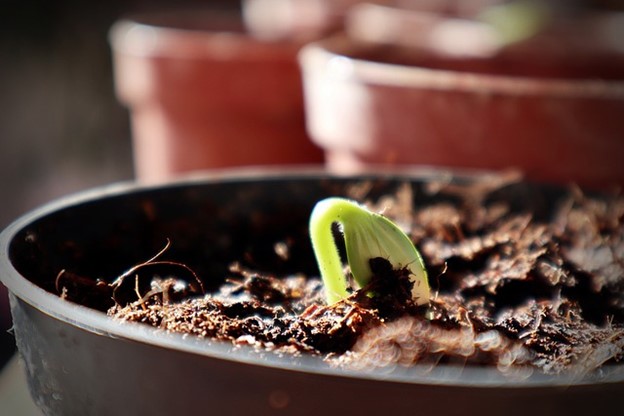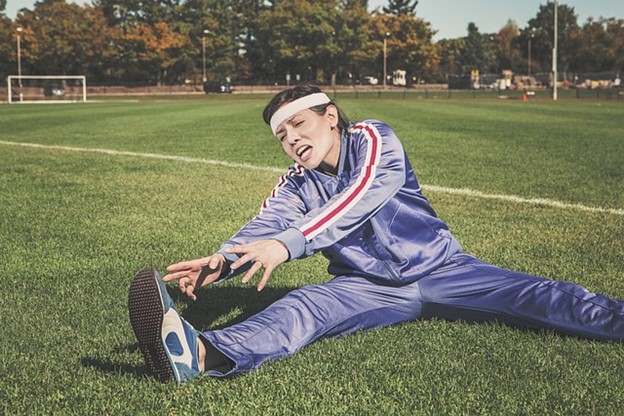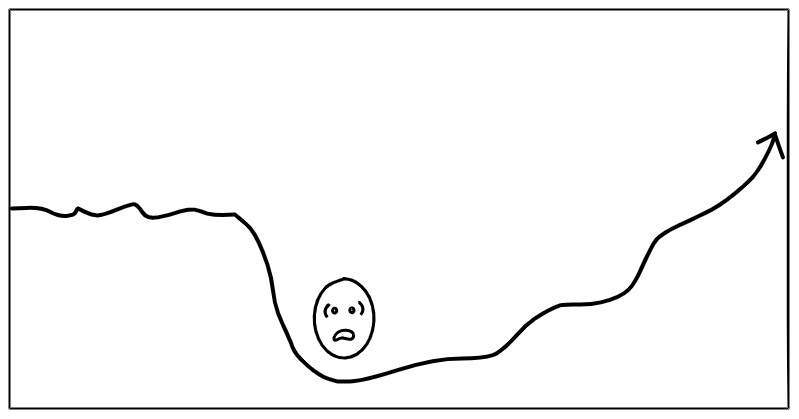
Self-improvement takes patience and commitment. This is because of two phenomena: The Lag and The Dip.
The Lag
“Just because results are not visible doesn’t mean they are not accumulating.” –Shane Parrish1
In 1979, Bill Walsh took over the San Francisco 49ers. They were, at that time, the worst team in football. Walsh took pains to change the culture from one of losing to one of excellence. “Players could not sit down on the practice field. Coaches had to wear a tie and tuck their shirts in. Everyone had to give maximum effort and commitment.” These policies, and much more, were what they needed to turn things around.
“The year before Walsh took over the 49ers, they went 2 and 14. His first year as head coach and general manager, they went … 2 and 14. Can you imagine the disappointment? All the changes, all the work that went into that first year, and to end up in the exact same spot as the incompetent coach who preceded you?” But Walsh stuck with the program, and his team kept working hard. “Two seasons later, they won the Super Bowl and then several more after that.”2
This story demonstrates that there is often a delay between a positive change and the ensuing benefits.
“The Lag” is a common issue in self-improvement. You start some healthy habit, but the benefits don’t come right away:
- You can start eating better, but you won’t become noticeably thinner for weeks.
- You can start exercising, but you won’t feel significantly stronger for months.
- You can start meditating, but your focus and patience won’t improve dramatically for years.
If you don’t know about The Lag, or if you don’t have the patience to work through it, you’ll become discouraged, lose motivation, and quit.

The Dip
In March 2015, I was in a bad place. Suffering from multiple injuries, in constant pain. Severely depressed, constantly anxious. Feeling hopeless and helpless.
I “dealt” with it by using a lot of marijuana, occasionally binge drinking, and taking pain pills whenever I could get them. This broken strategy led to an emotional rock bottom where, finally, I resolved to quit.
The first week was bad. Forced to finally confront my problems head-on, I was overwhelmed and distraught. A week after I got sober, I had a panic attack. I ran from my apartment, hyperventilating and crying uncontrollably, to a nearby park, where I called a friend to come rescue me from myself.
But two weeks later, my depression and anxiety had all but evaporated. Despite the extreme initial setback, sobriety was the right choice. I had survived “The Dip” and come out on the other side.

There are situations in life where we expect and accept The Dip. When you get surgery for an injury, you know that it’s necessary for long-term improvement, but that it will involve short-term pain and reduced functionality.
Well, radical change is akin to surgery. It has to get worse before it gets better.
For example, you could easily come out of a productive therapy session feeling worse. But this dip is part of the healing process. Perhaps you came to a painful, but necessary, realization. Perhaps you finally confronted your fear, your shame, or your trauma.
Parents who have fallen into the trap of micromanaging their teenagers witness The Dip when they finally step back and start letting their kid manage their own schoolwork. Academic performance initially drops because the kid is struggling to figure it out. But they eventually find some strategies and build some skills, coming out stronger and more capable on the other side.
If you don’t know about The Dip, you might see it as a sign you’ve taken the wrong path.

Then, disheartened, you’ll backtrack and miss out on the long-term benefits that can only be found across the valley.
Motivation in Spite of The Lag and The Dip
The Lag and The Dip are inherently demotivating, so you need strategies to get through them without giving up.
For one, knowing that it will eventually get better is helpful. When I first got sober, I understood that my brain would rewire and that my neurochemistry would reset, and I knew that this would take time. Likewise, I committed to daily meditation because I had seen research on its many benefits.
But aside from this, keeping your eyes on the prize is a mistake. It’s far more effective to keep your eyes on the process. Focus on showing up consistently.
To do this, keep track of your effort via an effort-tracker or calendar chain. Every time you put an X in a box, you’re giving yourself a little pat on the back – a mini-celebration of your progress. And seeing the all of the Xs – the evidence of your efforts – is surprisingly motivating.

Another thing that helps is reading about other people who experienced The Lag or The Dip but stuck with it and ultimately succeeded. These need to be real success stories – complete with struggles and setbacks – not the whitewashed hero myths of solitary genius and overnight fame. Lincoln’s election losses. Edison’s failed experiments. Keep these models in mind as put your head down and keep working.
Lastly, you don’t have to navigate The Lag or The Dip alone. Many people find it helpful to have an exercise buddy to make it more enjoyable and to create accountability. Solo-entrepreneurs use coworking spaces to be around other people who are working on projects with distant, uncertain payoffs. And you can get through the difficult, early stages of behavioral change under the guidance of a habit coach like me.
1 https://fs.blog/brain-food/june-16-2024/
2 Holiday, Ryan. Ego is the Emeny. Portfolio, 2016.
